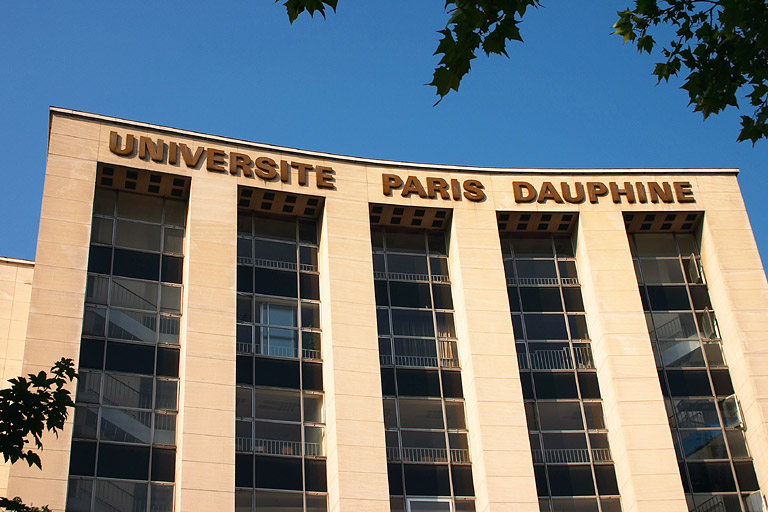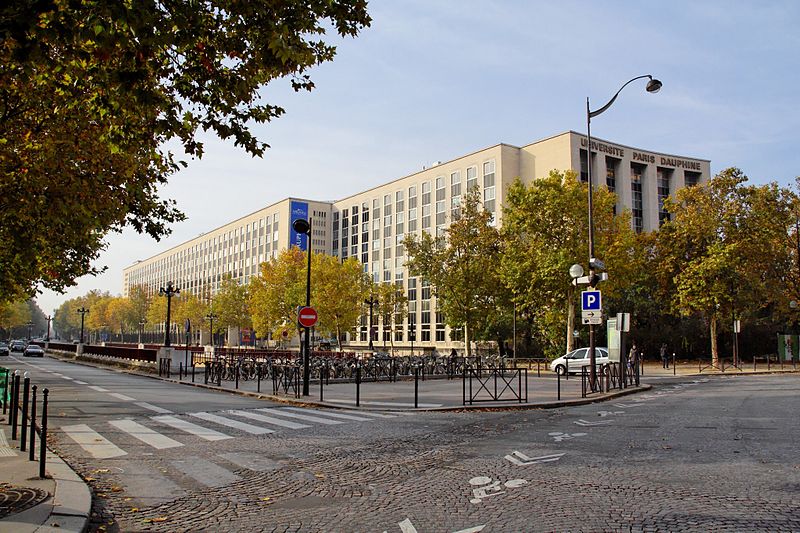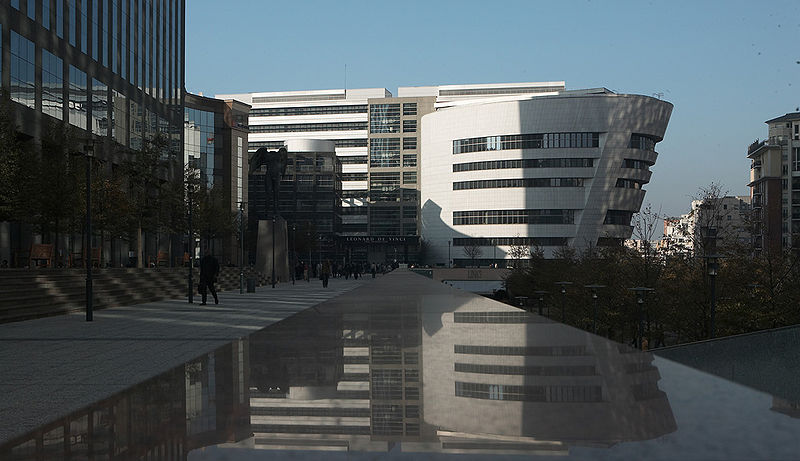<Back to Index>
- Université Paris VIII Vincennes Saint - Denis, 1969
- Université Paris IX Paris - Dauphine, 1971
PAGE SPONSOR
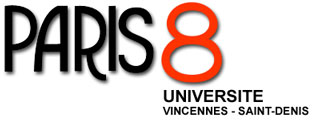
The University of Paris VIII or University of Vincennes in Saint - Denis (French: Université de Vincennes à Saint - Denis) is a public university in Paris. Once part of the federal University of Paris system, it is now an autonomous public institution and is part of the Academy of Créteil. Most undergraduate degrees (except Modern Languages) are taught in French.
It was founded as a direct response to events of May 1968. This response was twofold: it represented a sympathetic response to student demands for more freedom, but it also represented the movement of students out of central Paris, especially the Latin Quarter, where the street fighting of 1968 had taken place.
Founded in 1969, the new experimental institution was named "Centre Universitaire Expérimental de Vincennes" (C.U.E.V.) in Vincennes. In 1971, it gained full university status, thus allowing it to award its own degrees, and renamed "Université Paris VIII". Since moving to Saint - Denis in 1980, the university has since become a major teaching and research center for humanities in the Île - de - France region.
As soon as it opened, Vincennes became the venue for a continuation of 1968, being occupied almost immediately by student radicals, and being the scene of violent confrontations with the police.
It became particularly notorious for its radical philosophy department, assembled and then headed by Michel Foucault, who in this stage of his career was at his most militant, on one occasion participating in a student occupation and pelting the police outside the building with projectiles. The scandal of this department emerged not around this incident, however, but around one of the philosophy professors, Jacques Lacan's daughter Judith Miller, who was not only a committed communist, like most of the faculty, but indeed a Maoist as well. The department had its accreditation withdrawn after it was revealed that Miller had handed out course credit to someone she met on a bus. (Miller was subsequently fired by the Education Ministry after saying in a radio interview that the university was a capitalist institution and that she was trying to make it function as badly as possible.)
Since the turmoil in the late 1960s, the University has endorsed a far more mainstream academic life and has brought in new departments, new professors, and national rules to effect this change. In 1980, the University was relocated to Saint - Denis. The University's capacity of 24,000 students per year makes "Paris VIII" an important university with internationally recognized departments in Political Sciences, Cinema Arts, Communication Studies and Feminist Studies.
The university offers over a hundred undergraduate, graduate and diploma courses.
Paris - VIII has partnerships with several universities around the world. They include the UC Berkeley, the Beijing Film Academy and the University of Berlin.
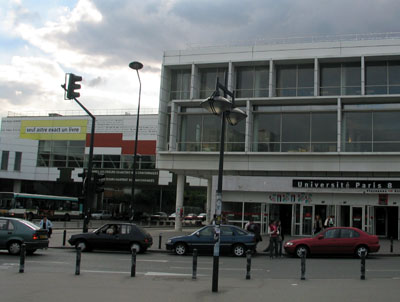
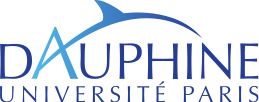
Paris Dauphine University (Université Paris - Dauphine), often referred to as Paris Dauphine or Dauphine is a public research and higher education institution in Paris, France. Its complete name is University of technology in sciences of organization and decision - making of Paris - Dauphine (Université de technologie en sciences des organisations et de la décision de Paris - Dauphine). Dauphine was founded as a faculty of economics and management in 1968 in the former NATO headquarters in Western Paris. Since its creation, Paris - Dauphine University has enjoyed considerable autonomy in terms of scientific and teaching innovations.
In 2004, Dauphine was granted the status of grand établissement which has enabled the university to have a highly selective admissions process. While giving the university more freedom in its actions, it also allowed the university to consolidate an ambitious project based on a coherent range of selective, vocationally oriented courses. Its essential academic objectives focuses on development and certification of research, initial training and continuing education. Some laboratories are located in the university as the Lamsade.
Dauphine’s international relations cover:
- Paris Dauphine University is also present in Tunis through the Tunis - Dauphine Institute.
- 180 agreements with more than 40 countries
- 6 joint diplomas with two universities:
- The Autonomous University of Madrid
- Goethe University, Frankfurt
- 24.9% international students enrolled in various programs or diplomas in 2004 - 2005, including several students from Latin America, Eastern Europe and Asia.
Some notable Professors of Dauphine such as Professor Pierre - Louis Lions (Fields Medal in 1994), Professor Witold Litwin (inventor of linear hashing and the only fellow of the Association for Computing Machinery in France).
According to the newspaper Le Nouvel Économiste, Paris - Dauphine University was ranked among the 6 best business schools in France in 2008 (ESSEC, HEC, ESCP EUROPE, Sciences Po, EM LYON, Dauphine) and was ranked among the 4 best institutions in France according to the Challenges - Who's who ranking in 2010 (ENA, Polytechnique, HEC, Dauphine).
National rankings
- 2011: 5th business school of France according to Eduniversal ranking
- 2010: 4th university of France according to the Challenges magazine-Who's Who ranking
International rankings
- 2011: 18th best university in the world in "Mathematics" according to the Shanghai ranking
- 2011: 324th best university in the world according to the QS university ranking
- 2010: 97th/1000 business school of the world according to eduniversal ranking
- 2008: 64th university in the world according to the Ecole Supérieure des Mines de Paris ranking
Master 203 Financial Markets, Commodity Markets and Risk management The Master 203 is designed to train specialists in financial markets who put their skills to work for banks and investment firms, asset management firms, consultancies, insurance companies or major firms. It trains students in all professions linked to investments on financial instruments markets and financing based on market techniques.
Master 225 Corporate Finance and Financial engineering The Corporate Finance and Financial Engineering Masters Program 225 has trained almost one thousand students to practice financial professions with high levels of responsibility. This Masters Program provides solid training in two complementary areas of expertise: both corporate finance, and financial engineering and mergers and acquisitions, which are used above all within investment banking.
Master 272 Financial Engineering and Quantitative Economics The Financial Engineering and Quantitative Economics Program 272 prepares students to topics such as the techniques of quantitative finance, corporate finance, asset management and market risk management. For this, the curriculum combines the teaching of financial theory and its application in business while training students for computational methods in finance.
Master 201 Economics and Financial Engineering The Master 201 provides an excellent program in economics and finance. The program is made with the contribution of many CEOs, financial organizations and banks. In collaboration with the Magistère BFA and Bocconi, this master is mainly focused not only on market finance but also on financial economics. Many alumni succeed as well in other sectors dealing with econometrics in optimization costs, actuarial science, or even marketing thanks to the diversity of courses.
Master 264 Entrepreneurship The Master 264 provides a formation in Entrepreneurship ranked 7th by the SMBG's ranking in 2012, the first University in the ranking. The formation provides skills in management, finance, accountability, management of project and helps many students to set up their own business.
Magistere Banking Finance Insurance The Magistère BFA was created in 1986 and since its early stage it has ranked among the most highly reputed French Master Degrees in Banking, Finance and Insurance. The program spans 3 full academic years and one year possibly more for an internship between the second and the third year, or one possibly more in a partner institution abroad. Indeed, partner institutions range from London School of Economics and Political Sciences in London, Bocconi in Milano, Washington University in St. Louis or McGill University in Montreal to name a few. The Magistère main objective is to provide students with all the necessary skills likely to enable them to achieve a challenging career in Market and Corporate Finance, Banking and Insurance. Indeed, courses range from not only stochastic calculus, times series - econometrics or actuarial methods to private equity or financial analysis but also economics and law.
Mphil MASEF Mathematics of Finance, Economics and Insurance The master MASEF is a program co-organized by University Paris Dauphine and ENSAE ParisTech. The Master is one of the first Master Mathematics of Finance in France. The program includes two study courses. Both ensure a training of high level in mathematics (stochastic calculus and control, econometrics of finance / insurance) applied to the conception and use of sophisticated models in finance, insurance or more broadly in economy.
1. Quantitative Finance and Risk Management: quantitative methods on financial markets, strong orientation to risk control and portfolio management.
2. Economy and Management of individual risks: modeling of individual behaviors and interaction (important for modeling and management of individual risks in industry, insurance and the bank world).
Mphil 106 Financial and Monetary Economics is linked to the Master 201 and emphasizes the same skills, it is more research oriented.
Master of Technology and Innovation Management (MTI) is co-offered by Paris Dauphine University, the National Institute for Nuclear Science and Technology (INSTIN - CEA), Mines ParisTech and the École Normale Supérieure de Cachan (ENS Cachan). The MTI master aims to train administrators and engineers in technology and innovation management.
